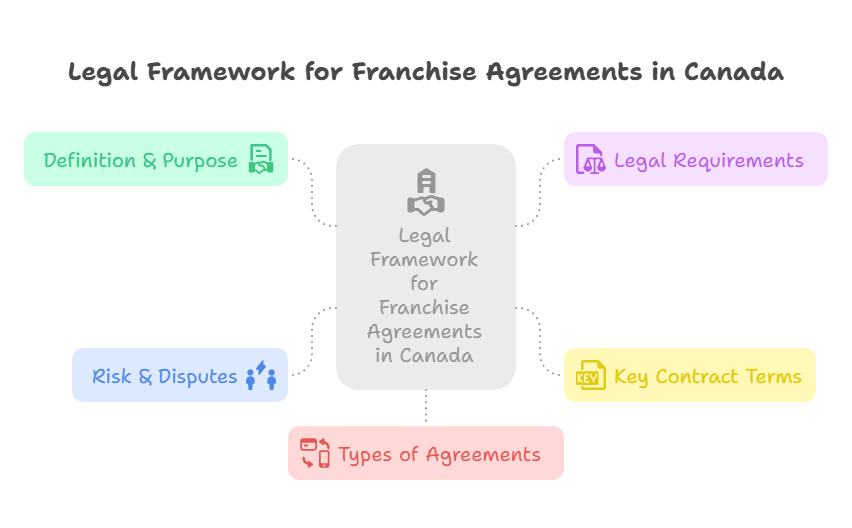Franchising fuels Canada’s economy. Over 76,000 franchises generate $100 billion annually, reports the Canadian Franchise Association. Franchise agreements shape these businesses, setting clear rules for brand owners and operators. Canada’s strict provincial laws, like Ontario’s Arthur Wishart Act, add layers of complexity. These contracts cover rights, duties, and risks, impacting success.
This guide explains four main agreement types: single-unit, multi-unit, area development, and master franchise. It offers clear insights for entrepreneurs navigating Canada’s franchise landscape.
This guide will help you understand:
- Four primary franchise agreement types and their structures.
- Roles and responsibilities for franchisors and franchisees.
- Key legal requirements under Canadian provincial laws.
- Practical benefits and challenges of each agreement type.
- How to approach franchise agreements with confidence.
Legal Framework for Franchise Agreements in Canada
A franchise agreement binds a franchisor, the brand owner, to a franchisee, the operator. It details how the franchisee uses the brand’s systems, trademarks, and model. In Canada, laws like Ontario’s Arthur Wishart Act require a Franchise Disclosure Document (FDD) 14 days before signing. The FDD covers franchise contract terms, including fees ($20,000–$100,000), royalties (4–8% of revenue), territorial rights, and operational guidelines. This ensures transparency.
Agreements vary by scale. They address intellectual property rights, training, and marketing duties to maintain brand standards. Missteps can lead to disputes. For example, a franchisee in Halifax might lose customers if their agreement allows another location nearby. Provincial laws in Ontario, British Columbia, and Alberta stress fair dealing. The franchise agreement structure shapes the business relationship. Each type—single-unit, multi-unit, area development, and master franchise—carries unique legal and operational demands, detailed below.

Single-Unit Franchise Operations
A single unit franchise agreement suits new franchisees. It lets you run one location using the franchisor’s brand and systems. A Toronto entrepreneur might open a single Tim Hortons, tapping into its strong market presence.
Roles and Responsibilities
- Franchisor: Supplies the business model, trademarks, and training. They provide support, like marketing, and collect fees and royalties.
- Franchisee: Funds the location’s setup, including equipment and leases. You manage operations, hire staff, and pay fees ($20,000–$50,000) and royalties (4–8%).
Advantages
- Lower costs, typically $100,000–$500,000 total.
- Simple to manage, focusing on one site’s success.
- Less risky, ideal for testing franchising.
Disadvantages
- Limited income from one location.
- Exposed to local market risks, like competition.
- Costlier to expand later via single-unit deals.
Canadian law requires FDD compliance. Ontario’s Arthur Wishart Act demands disclosure of fees and termination clauses. A franchise agreement example involves a Subway franchisee in Toronto. Their FDD review clarified renewal terms, preventing disputes. Single-unit agreements offer a low-risk entry, but legal review ensures fair terms.
Multi-Unit Franchise Operations
A multi unit franchise agreement lets you run multiple locations under one contract. It fits experienced franchisees aiming to grow. You might open three Pizza Pizza stores in the Greater Toronto Area, using the brand’s popularity.
Roles and Responsibilities
- Franchisor: Offers training, site selection, and systems for multiple sites. They ensure compliance and collect fees and royalties.
- Franchisee: Funds and manages multiple locations. You pay higher fees ($100,000+ per unit) and royalties, handling complex operations.
Advantages
- Multiple sites boost revenue through diverse streams.
- Economies of scale cut costs, like supplier deals.
- Territorial rights may limit local competition.
Disadvantages
- High costs, often over $1 million.
- Complex management needs strong skills.
- One site’s failure can hurt overall finances.
Canadian law requires an FDD per unit, detailing territorial rights. Alberta’s Franchises Act mandates termination history disclosure. A franchisee running three Ontario retail stores gained clear territorial protections through legal review, avoiding overlap. Explore franchise options with Cloudhaus Law’s guidance to align your agreement with your goals.
Area Development Franchise Operations
An area development franchise agreement requires you to open multiple locations in a set territory and timeframe. It often grants exclusive rights. You might launch five retail franchises in Ontario over three years, controlling the market.
Roles and Responsibilities
- Franchisor: Aids site selection, lease talks, and training. They provide the FDD and agreement, collecting development fees ($5,000–$20,000 per unit) and royalties.
- Area Developer: Funds and runs units, meeting strict opening deadlines and paying franchise fees.
Advantages
- Exclusive territory blocks other franchisees.
- Efficient expansion builds brand presence.
- Multiple units drive high revenue potential.
Disadvantages
- High costs, often millions, for multiple sites.
- Tight deadlines risk penalties if missed.
- Managing sites demands strong systems.
Canadian law requires detailed FDDs. Ontario’s Arthur Wishart Act ensures clear fee disclosures. A client opened five GTA gym franchises, with legal review ensuring realistic timelines. Area development suits operators with resources to scale fast.
Master Franchise Agreement Operations
A master franchise agreement lets you develop units and recruit sub-franchisees in a region, often for global expansion. You might bring a U.S. coffee chain to Canada, opening and licensing locations.
Roles and Responsibilities
- Franchisor: Supplies the FDD, agreement, and training. They share royalties and monitor brand standards.
- Master Franchisee: Opens units, trains sub-franchisees, and ensures compliance. You collect and split fees with the franchisor.
- Sub-Franchisee: Runs individual units, paying fees to you.
Advantages
- Exclusive rights reduce regional competition.
- Sub-franchisees fund their units, lowering costs.
- Royalties from sub-franchisees boost income.
Disadvantages
- High oversight duties for sub-franchisees.
- Complex Canadian and international franchise agreement rules.
- Sub-franchisee failures affect your reputation.
International franchise agreements involve trade regulations. A master franchisee we supported brought a U.S. restaurant to Canada, with clear royalty terms ensuring compliance. Master franchises suit experienced entrepreneurs.

Legal Aspects of Canadian Franchise Agreements
Canadian franchise agreements require careful legal attention. Key elements protect both parties:
- Franchise Term and Renewal: Agreements last 5–10 years. Ontario’s Arthur Wishart Act requires clear renewal terms in the FDD, like performance metrics, to avoid disputes.
- Termination Clauses: These list reasons for ending the agreement, like non-payment. Clear terms prevent sudden losses.
- Non-Compete Clauses: These limit similar businesses during or after the agreement, often for two years within 10 kilometers. Courts ensure fairness.
- Dispute Resolution: Mediation or arbitration clauses are common. Canadian laws support fair processes.
- Intellectual Property: Franchisors protect trademarks. Clear usage terms avoid penalties.
- Fees and Royalties: Initial fees ($20,000–$100,000) and royalties (4–8%) need clear FDD disclosure.
- Marketing Duties: Franchisees pay 1–3% of revenue for ads. Terms must be transparent.
Provincial laws, like British Columbia’s Franchises Act, require material change disclosures, such as litigation. Cloudhaus Law’s flat-fee model ensures clarity, backed by our work with over 80 franchise locations.
Why Choose Cloudhaus Law? Your Trusted Partner for Franchise Success
We’ve helped more than 80 franchise locations across Canada set up their legal structures the right way from the start. Whether you’re buying your first unit or scaling to a multi-unit enterprise, the legal groundwork matters.
At Cloudhaus Law, we provide:
- Flat-fee pricing, so there are no billing surprises
- Legal support from a dual-licensed lawyer (Canada/U.S.)
- Experience across industries including retail, food service, and service-based franchises
- Virtual consultations tailored for Ontario and national clients
One client who opened a franchise in Mississauga started with one location. We helped them incorporate, meet franchisor requirements, and later restructure to support two additional units. Their expansion was seamless because their legal base was sound from day one.
Common Questions About Franchise Agreements
What is the most common type of franchise agreement?
The single unit franchise agreement is the most common. It suits new franchisees with lower costs and simple management. In Canada, laws like Ontario’s Arthur Wishart Act require detailed FDDs, covering fees and obligations. A franchise lawyer Toronto ensures fair terms, reducing risks like unclear clauses.
How does a business format franchise differ from a product distribution franchise?
A business format franchise agreement offers a full system, like branding and operations for fast-food chains. A product distribution franchise agreement focuses on selling products, like beverages, with less control. Both need FDDs in Canada, but business format franchises require stricter compliance.
What is a master franchise agreement?
A master franchise agreement lets you develop units and recruit sub-franchisees, often for global markets. You act as a regional franchisor, sharing royalties. Canadian and international laws demand compliance, and legal guidance clarifies terms.
Can a franchisee own multiple units under one agreement?
Yes, a multi unit franchise agreement allows multiple locations under one contract. It offers economies of scale but needs high investment ($100,000+ per unit). Canadian FDDs detail territorial rights for clarity.
What is included in an area development franchise agreement?
An area development franchise agreement requires opening multiple units in a territory, granting exclusive rights. It includes development fees ($5,000–$20,000 per unit) and FDDs. Canadian laws ensure clear disclosures.
Are international franchise agreements different from domestic ones?
International franchise agreements face cross-border issues, like trade rules, unlike domestic agreements under local laws, such as Alberta’s Franchises Act. Legal support ensures compliance for global expansion.
Can franchise agreements be customized for each franchisee?
Agreements can be tailored for fees or territorial rights, but brand consistency limits changes. Canadian FDDs and laws ensure fairness in customizations.
What is a manufacturing franchise agreement?
A manufacturing franchise agreement allows producing and selling products, like food items. It focuses on production rights. Canadian laws require intellectual property compliance.
Final Thoughts: Choose the Right Franchise Agreement with Confidence
Franchise agreements are not one-size-fits-all. Whether you’re starting with a single unit or planning to scale through multi-unit or master franchise models, your agreement must reflect your goals, resources, and responsibilities. Each type carries its own legal and operational demands, and overlooking the fine print can cost you more than money.
With Canada’s strict franchise laws and provincial regulations like Ontario’s Arthur Wishart Act, legal clarity is essential from the start. Understanding your rights, obligations, and the risks tied to each agreement type helps you make informed, strategic decisions.
At Cloudhaus Law, we help entrepreneurs across Canada select and structure the right franchise agreements for long-term success. Our legal support gives you the clarity to move forward with confidence, whether you’re opening your first location or leading national expansion.
Ready to align your franchise agreement with your business vision? Book a free consultation at cloudhauslaw.com or call (647) 965-0516 today.








